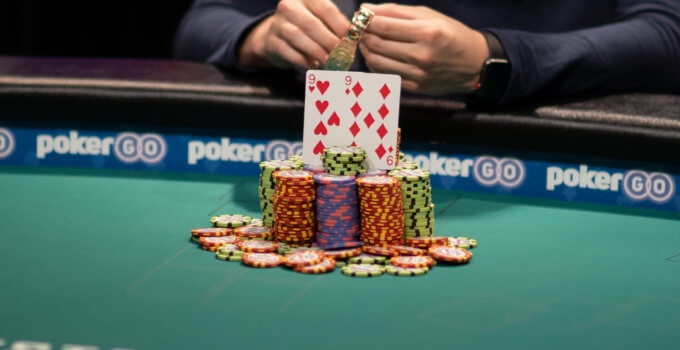How To Play Poker: History, Types, Best Tips For Beginners
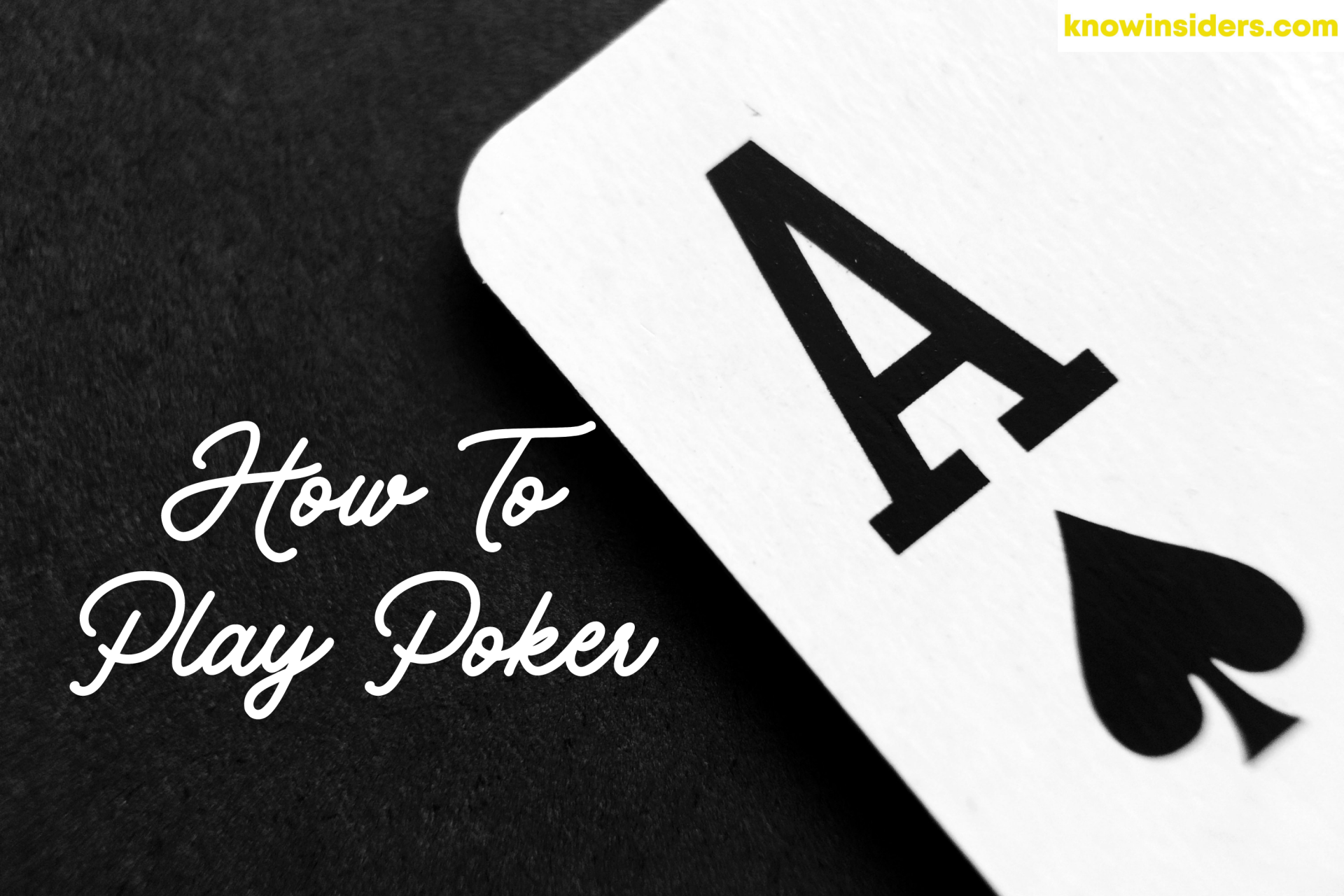 |
| How To Play Poker: History, Types, Best Tips For Beginners. Photo KnowInsiders |
The rise of online poker has contributed to it becoming one the most popular card games in the world, but there are so many different types of poker that it can seem daunting to the beginner. Poker is now played by professionals, amateurs, both at land-based casinos and many play poker online. So, what makes poker so popular, how old is it, and what was the biggest ever poker win?
What Is Poker?
Poker is a card game in which players place bets on who has the best hand (the group of cards you’re holding) according to variable rules depending on the type of poker you’re playing. The game uses a standard 52-card deck, but the number of cards you use depends on the type of game.
The value of each card in the deck can also vary, depending on the rules established by the dealer at the beginning of the game. Players enjoy poker in poker rooms at casinos, in community card games, and at home games.
What year did poker start?
Poker has been around since 1829 and started in New Orleans by French settlers. The game involved bluffing your way to a win or bets originally called ‘Poques’, which was similar to today's draw poker.
Joseph Cowell reported the game was played in 1829, with four players betting on the most valuable hand. By 1837, Hoyle, R.F. Foster noted that the game of poker, as it was played in the US, was 5 cards per player, from a 20-card deck. The game spread like rapid-fire, and shortly after, the 52-card deck we are familiar with today was introduced.
What is the longest game of poker ever?
You might have played a few games that seem to last forever but perhaps only last a few hours in the evening. The Bird Cage Theatre in Arizona claims that it is the home of the longest ever game of poker. The poker game started in 1881 and lasted an incredible 8 years, five months and three days.
The minimum buy-in was $1000, and it was played by very well-known wild west personalities like Diamond Jim Brady, Bat Masterson, Wyatt Earp and Doc Holliday. Legend has it that over $10 million changed hands over the 8 years, and 10% of that went to the Bird Cage.
Poker is the most lucrative sport in the world
Football, baseball, and basketball are all notable high-earning sports. However, when pitted against the five most significant cash prize awards in the super-high roller tournaments, they do not match up. The sum of the awards for poker is more than $44.2 million, securing poker as the most lucrative sport in the world.
In 1993 the WSOP Main Event poker match was the first tournament to have a prize pool of 1 million dollars.
READ MORE: Facts about Google allows Gambling Apps on Play Store in 15 countries
What is the biggest ever poker win?
There are several notable poker wins that increased pokers popularity globally.
The biggest prize belongs to Antonia Esfandiari.
Antonio entered the 2012 WSOP Big One for One Drop, which was a $1 million buy-in, and he walked away with a record-breaking win of $18.3 million.
Read More: Top 10 Largest Casinos In The World
12 Types of Poker
Among the different types of poker, the game can change based on variables that can include wildcards, poker rules, which hand is the lowest hand, and which card is designated as the high card. Some popular poker types include:
2-7 triple draw: The dealer issues each player five cards, facedown, before a betting round starts. Then, the first of three draw rounds begins, giving each player the ability to swap cards from their existing hand with ones from the dealer. There is then a second betting round and a second drawing round. A third betting round begins, then a final and third drawing round. In a 2-7 lowball game, the lowest-ranking poker hand wins.
5-card draw: In a five-card draw game, the dealer issues each player five cards to begin. Every player is given the option, in the order in which the dealer issued their cards, to trade in up to three of their cards for new ones from the dealer. The player at the end of that round with the best five-card hand wins.
7-card stud: A seven-card stud game is similar to a five-card draw game except the poker players are all dealt seven cards at the start. Of those seven, three cards are facedown, and the remaining four are faceup cards. Each player in a seven-card stud game has to create the highest-ranking hand from five of their seven cards. The player with the highest hand wins.
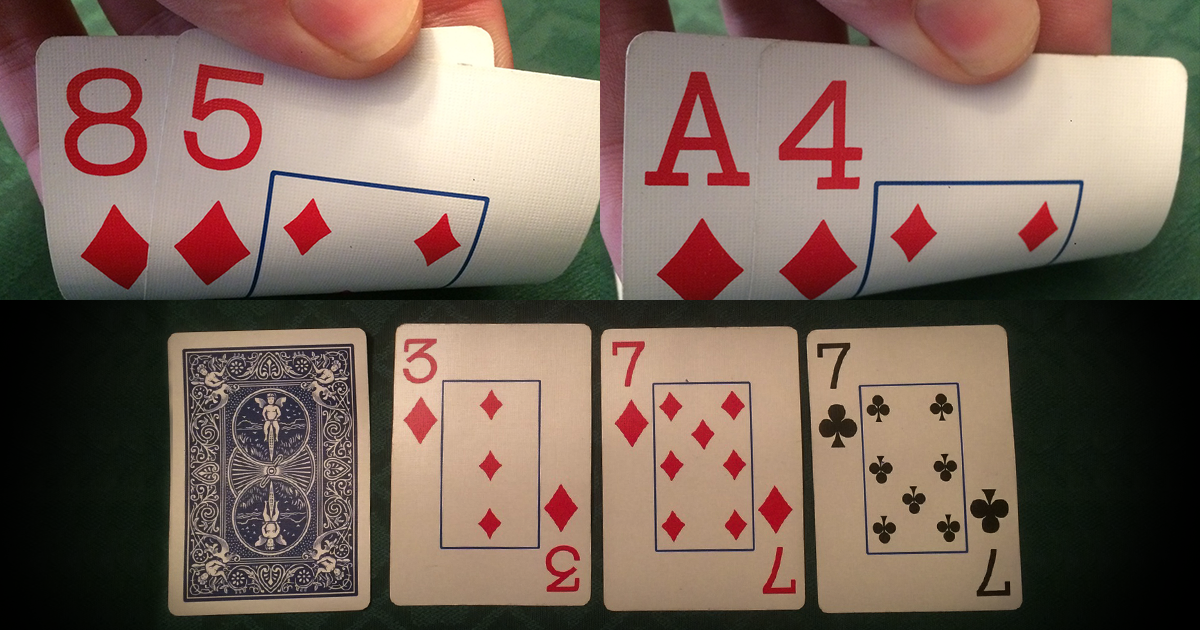 |
| Photo Poker Online |
Badugi: A game of badugi has the same ranking structure as in traditional poker except instead of aces being high-value cards, they are now low. The dealer issues players four cards instead of five, and then a betting round begins. Then the first draw round starts, in which each player can draw up to four cards at a time. A second betting round begins, then there’s another draw of up to four cards, followed by a third betting round. Then there’s the final draw, a final betting round, and then the showdown. The player with the best poker hand out of their four cards wins.
Chinese poker: This game begins with the dealer giving each of the two to four players 13 cards. Each player splits their cards into two hands with five cards and one hand with three cards. In Chinese poker, each one of these hands has a name: the three-card hand is called the front, and the two five-card hands are called the middle and the back. The goal is that the front hand should be the lowest-ranking hand, while the back should be the highest-ranking hand. The player sets their cards down on the table as follows: first the front hand, facedown and farthest from the player; second the middle hand, facedown and closer to the player; and third the back hand, facedown and closest to the player. Each player announces whether they are playing their hands. If so, they announce what royalties they are going to play (the group decides these units prior to the game). The players earn points based on the hands they reveal, and the winner collects royalty units.
Community card: These games, such as Texas hold ’em, are a variation on standard poker and require the dealer to hand out pocket cards to each player. There are also community cards dealt faceup on the table. Each player then creates a hand using their pocket cards as well as the community cards.
Draw: A variation on standard poker, a draw poker game allows the players to swap cards (usually up to three cards) with the dealer after receiving their first set of cards. The players then use those cards, as well as the original set, to create a hand.
Omaha hold ’em: Also known as Omaha or Omaha poker, this game is similar to Texas hold ’em in that there are four betting rounds and five community cards. However, the five community cards start faceup from the beginning, and each player receives four pocket cards instead of two. Each player makes their five-card hand from their four pocket cards and the five community cards. A variation on Omaha hold ’em is called Omaha hi/lo, with each player creating a five-card hand that’s high and another five-card hand that’s low.
Pineapple poker: Pineapple poker is similar to Texas hold ’em with a few changes. Each player begins with three pocket cards; they look at their cards and discard one of them. Then the first betting round starts. From there, the rules are the same as Texas hold ’em. A crazy pineapple poker version plays similarly, except the players hold onto all three of their pocket cards until the round before the dealer turns over or deals the fourth card, also known as the turn card. A version called lazy pineapple poker starts like pineapple poker, but a player doesn’t have to discard a card until the dealer turns over or deals the river card (the final card of five community cards).
Razz: A razz poker game is a lowball poker game (a type of game in which the lowest-ranking hand wins) in which the traditional rankings of the cards—ace is usually the highest, two is usually lowest—do not apply, with the ace instead being the lowest card in the deck. The goal of the game is to play a low hand rather than a high hand. Razz follows a stud format, meaning the players have no opportunity to swap their cards.
Stud: A stud poker game is a variation on standard poker. In stud poker, the player must put together their best hand out of the cards the dealer has issued to them. There is no card swapping in a stud game, and these games usually consist of five or seven cards per hand.
Texas hold ’em: After anteing up (meeting the minimum amount of money required to play), each player receives two pocket cards to begin, then the dealer places five community cards facedown on the table, and a round of betting begins. Next, the dealer turns three of the community cards, called the flop, faceup on the table. Another round of betting ensues. The dealer places the fourth community card, known as the turn, faceup on the table, and another round of betting occurs—but this time the stake is doubled. Finally, the dealer flips over the river, which is the last community card. A final round of betting occurs, and the stake is doubled again. Each player then folds or participates in the showdown, playing their hand using their pocket cards and the community cards. The winner is the one with the highest-ranked hand.
When was the first-ever online poker game?Online poker, as advanced as it is to play now, is relatively young. Online poker started on January 1st, 1998. There were several places to play poker before these legitimate poker websites, but January 1 called in a new era. Money was able to change hands, and it is reported that the first online hands of poker were $3/$6 Limit Hold 'em games. |
How to play in a poker in a nutshell: A game in brief
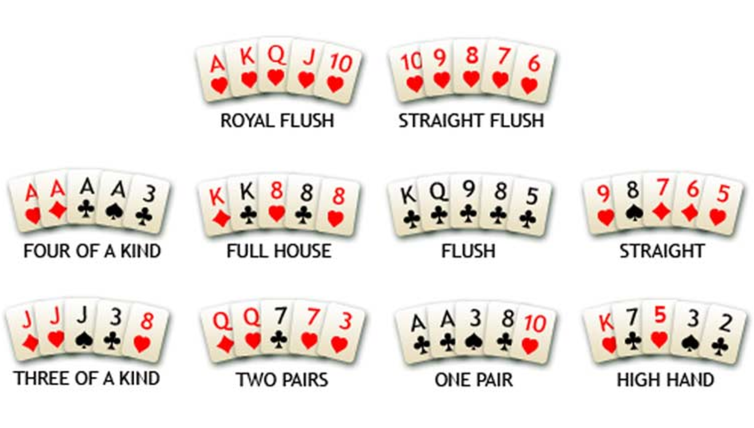 |
Here we illustrate how to play a game of poker in a nutshell. This is how to play the world’s current most popular type of poker, Texas Holdem.
Dealer deals each player two cards
The small blind is placed, followed by the big blind.
The first round of betting ensues, players bet according to confidence in their hand
Dealer deals three ‘community cards’ face up.
The second round of betting begins
Dealer deals the fourth community card, also known as the turn
The third round of betting begins
Dealer deals the fifth community card, also known as the river
The final round of betting ensues.
If two or more players still haven’t folded, all remaining players show their cards.
The winner is the one with the best hand according to the poker hand rankings.
| The many different types of poker can generally be classified as falling into one of the following four categories: Community card poker Players are dealt a number of cards less than a complete five-card poker hand. A number of face-up community cards are then dealt with the objective that the players make the best possible five-card hand with some combination of their own cards and the community cards. Straight poker The earliest form of poker, each player is dealt a full hand of five cards. A round of betting ensues in which players can raise and reraise until the game concludes. Famous varieties include: five-card brag, three-card brag Draw poker Another poker variation in which players receive all five cards at the beginning of the game, draw poker then allows them to attempt to improve their hand by discarding cards and being dealt replacements. Stud poker In stud-poker games, players are dealt their cards one by one in a specified combination of face-up and face-down cards, typically with a round of betting between each card being dealt. |
How to play poker: Concepts common to most types of poker
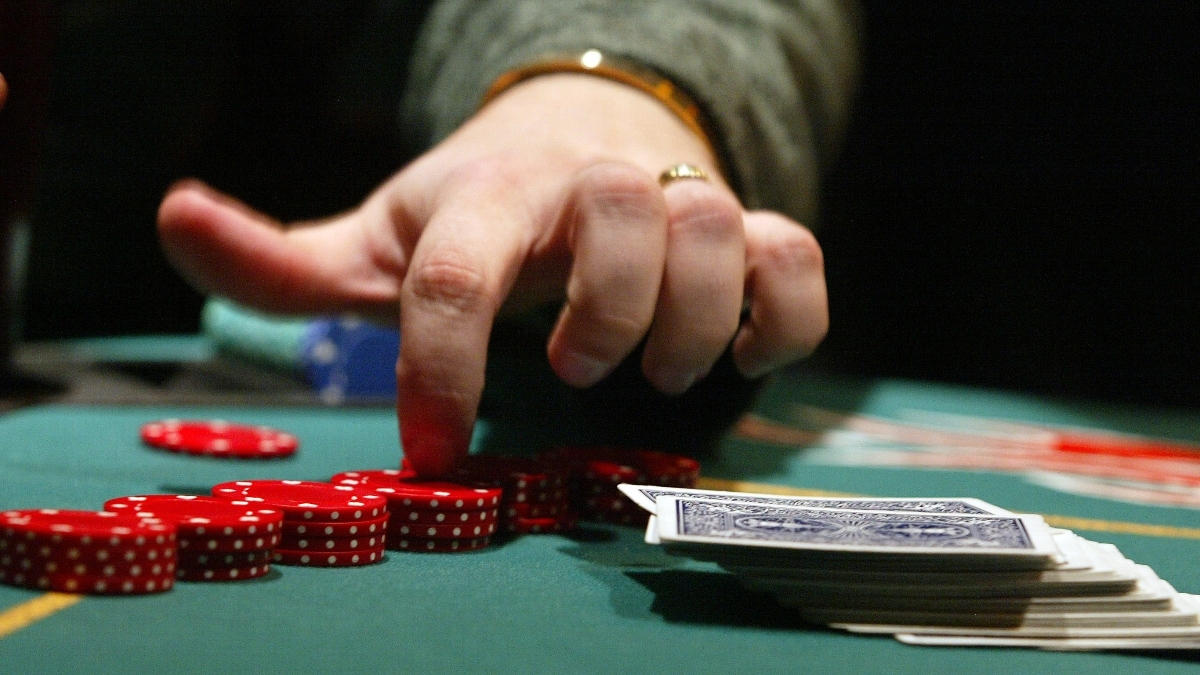 |
| Photo Action Network |
Poker-hand rankings
All games of poker are based around common poker-hand rankings which are used to decide which player’s hand wins in a game of poker.
Some poker game types will use the common hand ranking in different ways, such as making the lowest value hand the most desirable (low-ball poker).
Bluffing
It’s possible to win poker hands without holding the best hand by bluffing your opponents.
Bluffing usually involves projecting confidence in your hand by betting in a manner that suggests your hand is better than it is, in the hope that your opponents will believe you and fold rather than risk taking you on in the showdown.
Forced bets
Most forms of poker require some form of compulsory bet at the beginning of a hand usually referred to as the ‘ante’ or ‘blind’. Many forms of the game feature a small blind and a big blind, with the latter generally twice the size of the former.
The dealer
Whether you’re playing physical poker at home, at a bricks-and-mortar casino, or an online casino the role of the dealer determines the order in which the blinds are put up and players make their bets. The game usually unfolds in a clockwise direction starting with the dealer.
In both physical and online casinos the dealer is generally not one of the players so a token denotes which player is nominally the dealer for each hand. This then rotates clockwise from one hand to the next.
Betting options
Following the forced bets, the first round of betting begins. Players usually have the following betting options to use depending on their confidence in their hand.
Call — Matching another player’s bet or raise
Raise — Increasing the size of your existing bet in the same round of betting
Fold — To withdraw from the hand, sacrificing any bets already made.
Check — Until the first bet in a round of betting is placed, players can choose to check (decline to make a bet while reserving the right to bet later in the round).
All in — When a player doesn’t have enough chips left to call a bet they can play all their remaining chips. Subsequent betting takes place in a side pot and the all-in player can only win the amount of chips in the pot when they went all-in in any subsequent showdown.
Rounds of betting
In poker, each round of betting offers a chance to utilise the betting options outlined in the previous section, based on your confidence in your hand and your perception of the quality of your opponents’ hands. The latter can chiefly be gauged by seeing how much they are betting or raising.
All types of poker feature at least one round of betting, while the vast majority feature at least two.
These rounds usually take place before and after game events such as the dealing of the flop in Texas Holdem and allow for degrees of strategizing by players as the hand progresses. Texas Holdem and Omaha, which are so called ‘community card’ games, can feature up to four rounds of betting.
Tips for poker beginners
 |
| Photo KnowInsiders |
Don't play too many hands.
A very common mistake that amateur players make is not being selective enough with their starting hands. Don't fall into the common trap of thinking that ‘any hand can win'. Although this is true, some hands are more likely to win than others and will help you win more money, whilst others will help you in losing more money. So be selective about which hands you play.
Don't bluff too much.
Another common misconception about poker is that you need to bluff to win. You may see spectacular bluffs on the WSOP shows, but these are edited to show the highlights of the tournaments and so give the wrong impression of the frequency that top players bluff. Bluffing in poker is not as essential as you think it is.
If you are a beginner online poker player, it is better to play your cards well rather than trying to bluff your opponents out of hands. It is good to try occasional bluffs here and there, but the real art of knowing when to bluff comes from knowledge and practice.
Think about your opponent's cards.
It is vitally important in poker to think about the strength of your opponent's hand, and not just your own. It is nice to have a big hand, but if you think that your opponent has a better hand than you, you should prepare to fold. For example a straight is a decent hand, but if there are four cards of the same suit on the board and your opponent pushes all in, do you still think you have the best hand?
Play against players worse than you.
This may seem obvious, but you will be surprised at the number of players who go against this simple principle. If you are better than the players who you are playing against, it makes sense that you will be a winner in the long run. If you were the 10th best player in the world, it would not be profitable to sit at a table with the top 9 players in the world.
Choose your games and limits just as carefully as the cards you play with. Good table selection will help you to find those fishy poker tables in the lobby.
Pay attention to the game.
The best way to pick up tells is to watch your opponents and how they play in each pot. Even when you are not in the hand, you should still concentrate on the game to understand how your opponents play.
Hopefully you will see what moves the players make when they don't have the best hand, and what moves they make when they do have the best hand. The more information you can get from your opponents, the better the opportunity you will have to beat them.
Don't jump in at the high limits.
There are two reasons why you shouldn't play for too much money as a beginner. Firstly, the players at the higher limits will be better than the players at the lower limits. There is less chance that you will be able to beat them and you will spend a lot of money trying to learn the game in the process.
Secondly, you only want to play at limits you can afford. You should not play at limits where you are going to drop money that you cannot afford to lose. There is more information on this subject in the bankroll management article. You may also find the Fergulator tool useful too.
Know the rules.
As obvious as it seems, there is no substitute for knowing the rules of the game. You don't want to find yourself calling a player all in, thinking that your straight beats his flush and losing all of your chips. There is no way you can be a winning poker player if you don't know the fundamental rules of the game.
Furthermore, each card room and casino may have its own unique set of rules that you must abide by, so make sure you familiarize yourself with them before jumping into any game.
How many people play online poker today?According to the World Series of Poker, there are 100 million people playing poker online, and over 60 million of that is in the USA. All of those historical moments make poker one of the most popular ways to spend time both online and offline. Poker's history dates back centuries and is set to keep growing for years to come. No doubt adding more exciting things to poker's already rich history. |
 Mr Beast - How Does It Compare to Squid Game? Mr Beast - How Does It Compare to Squid Game? MrBeast's viral Squid Game recreation has reached 91 million views in less than three days, but how does it compare to the original Netflix series? |
 How To Win In A Casino: Best Tips & Tricks to Improve Your Chances How To Win In A Casino: Best Tips & Tricks to Improve Your Chances There are many approaches that will help you get the most out of the games. Read on to learn best useful tips and best tricks ... |
 Top 7 Most Popular Online Games In 2021 Top 7 Most Popular Online Games In 2021 If you are a fan of online games, you must know one of these most popular online games in 2021. Check out top 7! |


